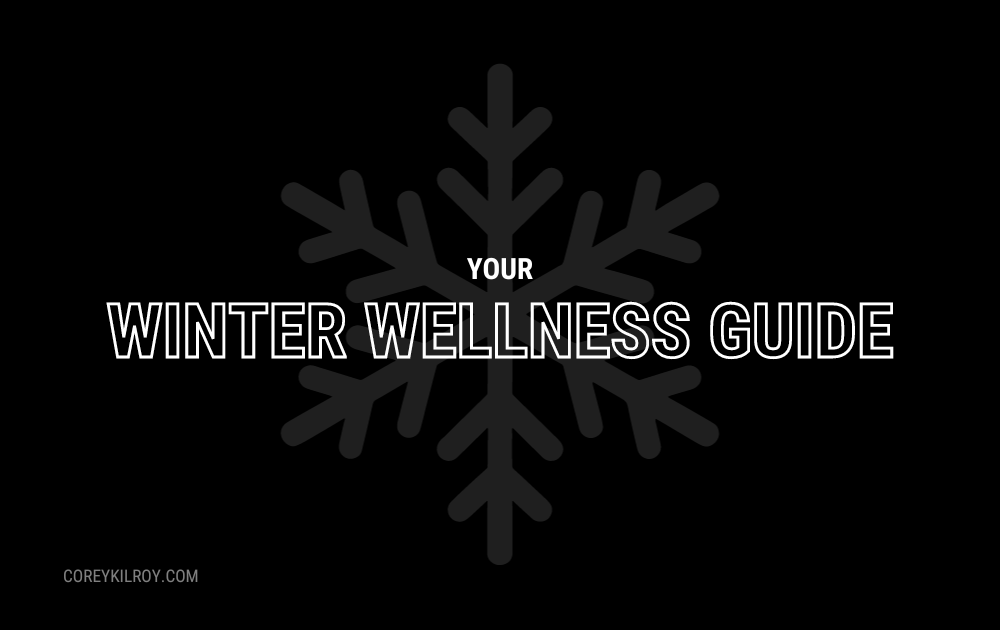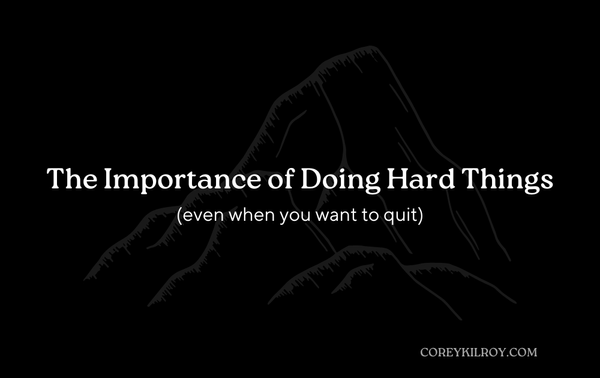Your Winter Wellness Guide.

The weather’s getting colder.
And we’re losing daylight sooner.
No wonder mental health tends to decline and illness spreads like wildfire.
There truly is something about the change of season that can get you out of sorts.
Some people will just feel more down than their usual selves, while a small percentage of people will experience a form of winter depression known as seasonal affective disorder (SAD) or seasonal depression.
SAD is a condition that comes and goes in seasonal patterns (commonly in the winter) where you may feel consistently “low” and notice changes in your sleep, energy, and mood.
But how do you determine if you’re battling SAD or you just have low energy this time of year?
Pay attention to timing.
People who suffer from SAD begin to feel symptoms in the fall, which continue throughout the winter and begin to ease up once the warm weather returns.
And whether or not it’s SAD depends on the severity of the symptoms you’re feeling.
You must experience symptoms of depression for it to be SAD.
You might experience:
-hopelessness
-trouble concentrating
-lose interest in activities you usually enjoy
-or see changes in your appetite and sleep schedule.
If it’s SAD these symptoms will clear up when spring returns… hopefully.
If you do suspect it’s more than just SAD, talk to your doctor, psychologist, or psychiatrist.
The icing on the cake is that these dark days coincide with cold and flu season.
The cold weather isn’t really the main culprit though.
Viruses just tend to be around more in the Winter, as more people are cooped up inside, interacting with more people.
More people plus more viruses in an enclosed space makes the sniffling hard to avoid.
But you don’t need to let winter win.
This essay serves as your guide to tackling this upcoming winter season head-on.
1. Stay Active. No matter what.
What kind of wellbeing, fitness guy would I be without mentioning the importance of exercise and movement?
Winter may be the easiest time of the year to blow off a workout:
- “It’s too cold out”
- “It’s too dark out”
- I just don’t have the energy today”
The list of excuses goes on and on, and trust me I’ve been there.
However, your body needs the boost exercise delivers to the immune system which is in constant battle during the Winter months.
Regular exercise is proven to boost your immune system by developing healthier T cells (the infection-fighting white blood cells) compared to those in sedentary individuals (source).
If you’re a runner, it may seem difficult to get yourself out the door, but the rewarding feeling after the run is all the motivation you need.
And if you do workout outside, try smart layering (with moisture-wicking materials) that you can easily pull on or off will help keep you going comfortably.
And worst case, you drive to the gym and make friends with the treadmill and weights.
Sounds like a win-win to me.
This may also be a great time to try something new!
Try signing up for an indoor workout class. Yoga, spin classes, or CrossFit workouts are all great options.
Every little bit of activity helps during this time of year.
You don’t need to lift heavy weights or sprint a marathon. Low-intensity workouts like yoga or walking outside can boost the body’s metabolism, which is especially important when you’re in “nesting mode” during the Winter.
2. Get some Vitamin D
Vitamin D is one of the only nutrients that’s synthesized in the human body, but this requires help from sunlight (our greatest source).
However, since sunlight exposure is reduced during winter, your body may produce much less vitamin D.
And the kicker? Most of us around the world are walking around with a deficiency already to begin with.
Vitamin D helps our bodies to absorb calcium, which is essential for our bone health. It also has several other important functions in the body, one of which is to help maintain a robust immune system.
So what are some ways to boost our vitamin D levels? Food and supplements.
Some foods that are rich in vitamin D include:
- Fatty fish (salmon, tuna & mackerel)
- Cod liver oil
- Mushrooms
- Dairy products
- Eggs
- Beef liver
Etc.
The second way to increase vitamin D is through supplementation, but there are some important factors to note.
When searching for a vitamin D supplement, make sure it is a vitamin D3 supplement, which is much more efficient in how it’s used in the body compared to D2.
3. Protect & nourish your skin
Cold and dry weather is a recipe for dry, parched skin, making skincare and hydration a must.
Cracked, dry skin is not only visually unappealing but it can also pose as a risk for bacteria to enter and cause some problems.
Not only does the dry weather harm our skin but also our breathing as well.
We’ve all been there, bloody noses during the winter are very common and not the greatest experience.
The solution? Treat your skin and moisten the mucus membranes in your nose with the help of a humidifier. Even placing one by your bed at night while you sleep can be helpful if you’ve come down with a cold or sinus issues.
Also: Moisturizer is your friend during the winter. When looking for a good moisturizer, keep an eye out for 3 ingredients:
- Glycerine - to slow down the evaporation process of moisture on your skin
- Hyaluronic acid - used to hydrate and plump the skin up with its ability to hold up to 1,000 times its weight in water
- Ceramides - to strengthen the natural moisture barrier on your skin
And yes, people with oily skin (such as myself) need to use a moisturizer too.
It’s also important to not forget the sunscreen during the winter too.
Harmful UV rays still beat down in the cold weather and can reach through the clouds.
Even if it snows, the rays can bounce off the white snow and cause a nasty sunburn.
4. Get sunlight when you can
When winter arrives, the late summer nights and sunsets at 8 PM disappear in a flash.
Daylight decreases dramatically during the winter and we need to get as much sunlight as possible when we can.
The brain produces less serotonin without sunlight, which can cause depression, which goes back to that dreaded seasonal depression I mentioned earlier.
Not only this but less sunlight can also increase melatonin in the body, which is why we may feel so tired and uninterested during the winter.
When and if you can, try heading outside between noon and 2 PM during your lunchtime when the sun’s at its highest.
If this is not achievable, a light therapy lamp is found to be useful in providing you with beneficial sunlight when in a crunch.
5. Prioritize sleep
Good, quality sleep is important year-round and plays an important role in optimizing your immune system so that your body can fight off infection.
I found that, according to one study, those who got 6 hours or less of sleep each night for one week were about four times more likely to catch a cold when exposed to a virus compared with those who got 7 hours or more.
A well-rested person is also more likely to make healthier food choices and have more energy to exercise. All of which help to maintain a better well-being at any time of the year.
6. Avoid staying in bed all day long
When the sun goes down before 5 PM and doesn’t rise again until after 7 AM, who isn’t tempted to slip into hibernation mode?
It’s important to fight the urge to hit the hay as soon as you get home from work and instead try to keep your sleep schedule on track.
To keep things consistent, try going to bed and waking up at the same time every day, no matter what time of year.
This keeps our circadian rhythm in check and creates a natural and biological clock within ourselves.
Your body will eventually end up naturally sticking to that sleep schedule, meaning an increased likelihood to fall asleep when it’s time, and waking up when you’re supposed to in the morning.
This is all crucial in the winter months when your body wants to naturally spend more time in “nesting mode”, chillin’ in bed.
7. Eat ‘right’
During the winter, we often crave different foods that will provide us some “comfort”, but it’s important to keep eating well through the season to help support your immune system and fight off infection.
No matter what time of the year, food is fuel, and we should be giving our body what it needs to function at its best.
Make sure to:
- Stay hydrated: getting essential nutrients, electrolytes, and minerals through the food and water we consume
- Prioritize protein consumption and nutrient-dense food choices to enhance satiety, recovery, muscle, and immunity.
Eating warm foods can also be beneficial during the winter months as well.
Soup and tea, for example, deliver a warming sensation, which can be comforting on a cold winter day.
Plus they contain antioxidants, which can help protect your health during the flu and sick season.
🏁 In the End…
The winter months can be a tough time for many individuals, including myself.
The colder weather and darker days are a recipe for decreased mental and physical well-being.
But this can all be avoided when we prioritize ourselves and stick to our healthy habits.
Prioritizing proper nutrition, training, and recovery are all factors that play a role in our well-being throughout the year, especially during the winter months.
Be safe and be well.
Until next time, C.



